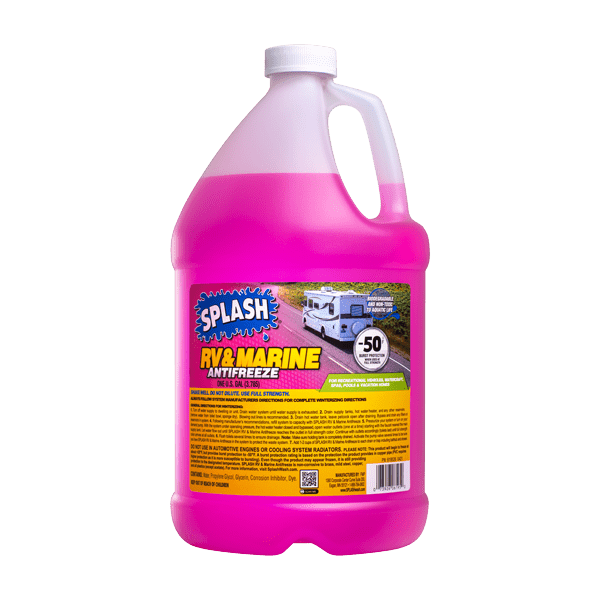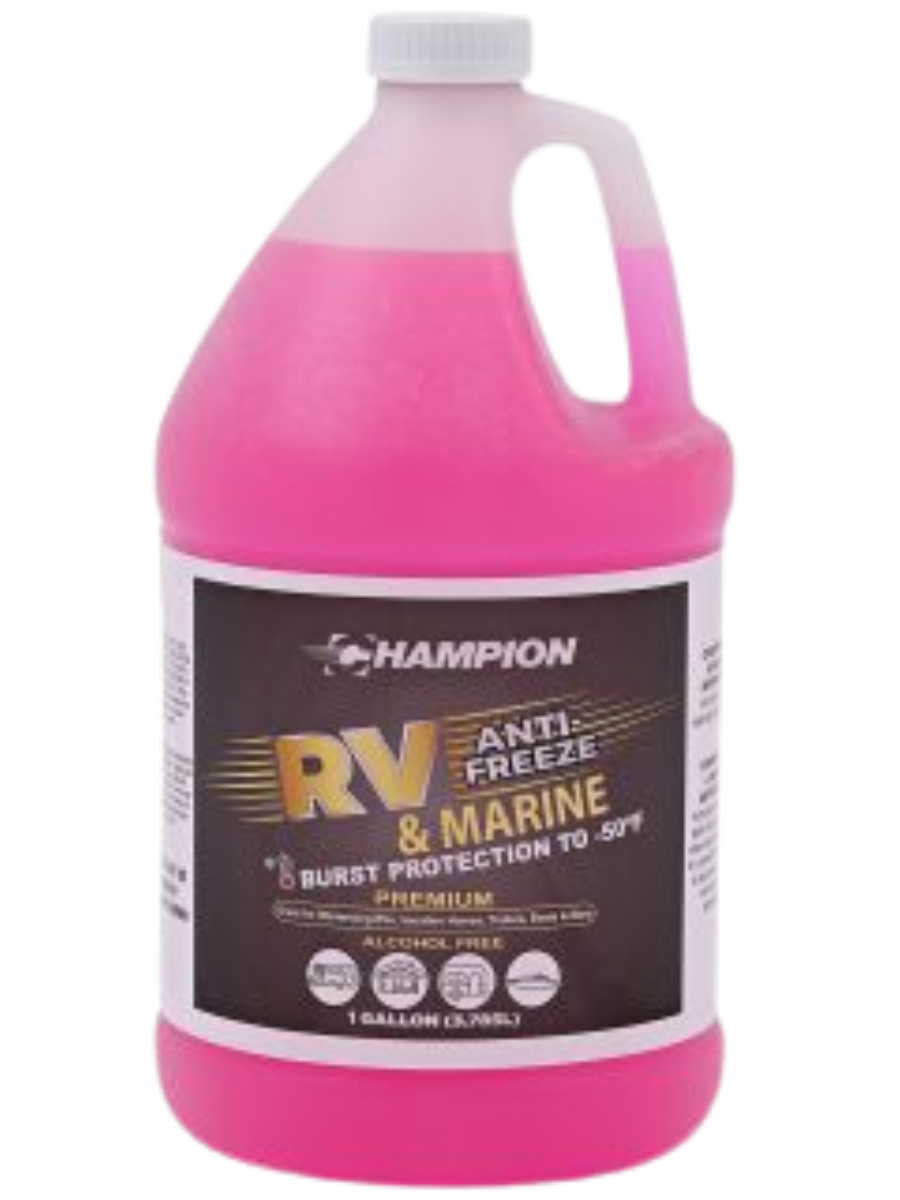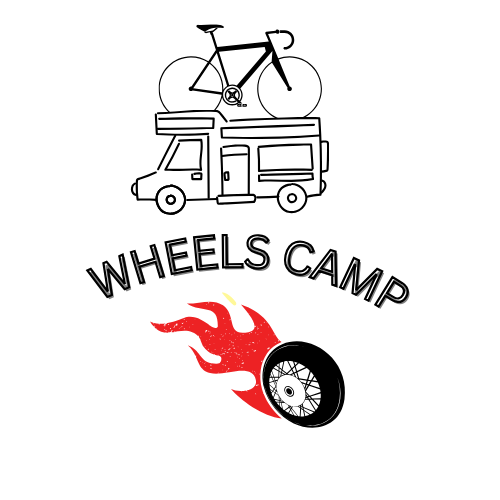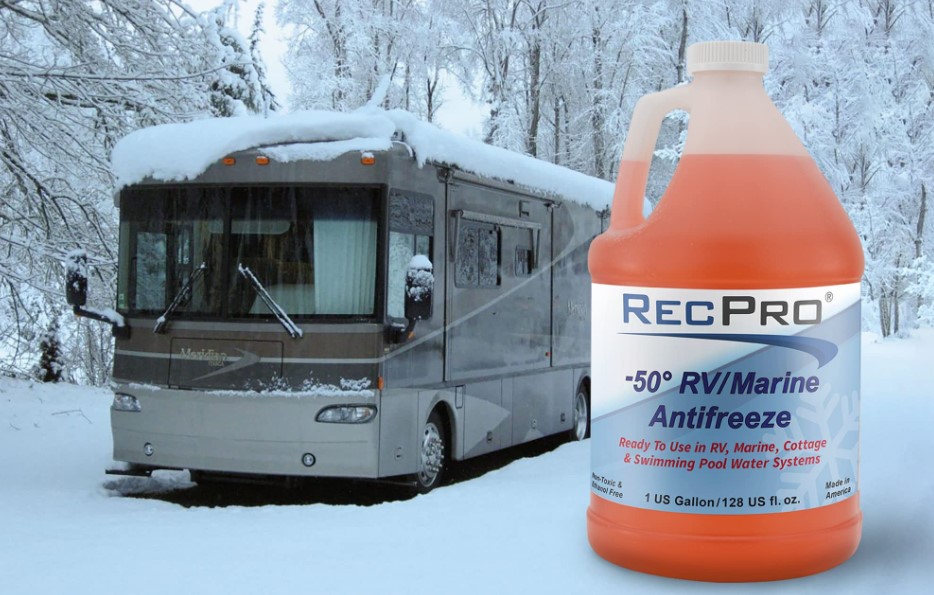RV antifreeze is made of propylene glycol or ethanol, both of which are non-toxic and safe for plumbing systems. RV antifreeze is a type of fluid that is essential for ensuring that the plumbing system of an RV or motorhome does not freeze in the winter.
When water freezes, it expands and puts immense pressure on the plumbing system, leading to burst pipes and various other issues. That is why RV antifreeze is used as a preventative measure to keep things running smoothly. The antifreeze is made of propylene glycol or ethanol, both of which are non-toxic and safe for plumbing systems.
We will dive deeper into what RV antifreeze is made of, how it works, and some tips on how to choose the right antifreeze for your RV.

Credit: www.amazon.com
What Is RV Antifreeze
RV antifreeze is a specialized product formulated to protect recreational vehicles during winter months when they are not in use. It is a non-toxic substance that serves as a lubricant for the RV’s plumbing system. RV antifreeze has a unique composition that prevents pipes and other plumbing components from cracking and bursting when the temperature drops below freezing.
Many RV owners make sure to flush their plumbing system with RV antifreeze before storing the vehicle for the winter. This simple yet effective maintenance procedure can save RV owners time and money and ensure that their vehicles are ready to use once winter comes to an end.
Different Types Of RV Antifreeze
As an RV owner, it’s important to have an understanding of the different types of RV antifreeze available in the market, especially during the winter season. These types of antifreeze, designed to protect your RV’s plumbing system from freezing, come in two primary types – propylene glycol antifreeze and ethanol alcohol-based antifreeze.
Propylene Glycol Antifreeze
Propylene Glycol is a chemical compound that’s commonly used as an RV antifreeze. It’s a non-toxic and biodegradable option that’s suitable for RV water systems. This type of antifreeze is a more expensive option than ethanol-based antifreeze, but it’s safer for pets and humans. Propylene Glycol antifreeze is ideal for RV water systems as it provides the necessary protection from freezing while ensuring the water system remains safe and clean. This is because it doesn’t react with the plumbing fixtures, causing any damage or corrosion.
Ethanol Alcohol-based Antifreeze
Ethanol Alcohol-based RV antifreeze is a cheaper option compared to Propylene Glycol but isn’t safe for human consumption and pets. This type of antifreeze is made from ethanol, which is an alcohol made from corn or sugar and is used as a fuel source. While it’s a more affordable option, ethanol alcohol-based antifreeze is not recommended for RV water systems. However, it’s ideal for winterizing other parts of your RV, including rubber seals, engine blocks, and axles. It’s best to be cautious when using ethanol alcohol-based antifreeze, as it can cause damage to rubber and plastic materials in your RV’s plumbing system, leading to cracking and leaks.
It’s crucial to choose the correct type of antifreeze for your RV, as this will protect the plumbing system from the harmful effects of winter weather. While Propylene Glycol antifreeze is a preferred choice for water systems, ethanol alcohol-based antifreeze is better suited for other purposes in your RV.

Credit: www.splashwash.com
Ingredients In Propylene Glycol Antifreeze
Propylene glycol antifreeze, commonly used in RVs, is made from a combination of propylene glycol and water. It is non-toxic and protects the RV’s water system from freezing during the winter months.
Antifreeze is an essential part of maintaining an RV, especially in areas with freezing temperatures. Propylene glycol antifreeze is a popular option preferred over ethylene glycol because it is non-toxic and safe for pets and humans. Propylene glycol antifreeze is a mixture of three main ingredients: propylene glycol, water, and corrosion inhibitors.
Propylene Glycol
Propylene glycol is a synthetic organic compound that is commonly used to make antifreeze. It is a colorless, odorless, viscous liquid that is non-toxic and has a slightly sweet taste. This compound has high fluidity, allowing it to flow easily through the engine and radiator. Propylene glycol has a lower freezing point than water, which makes it perfect for antifreeze applications.
Water
Water is another essential ingredient in propylene glycol antifreeze. It is usually added in a ratio of 1:1 or 50% to 50% with propylene glycol. Water is not only readily available and inexpensive, but it also helps to improve the heat transfer properties of the antifreeze. A higher proportion of water can improve cooling performance but reduces the boiling point of the antifreeze.
Corrosion Inhibitors
Corrosion inhibitors are another crucial ingredient in propylene glycol antifreeze, which helps prevent corrosion in the engine and radiator. Corrosion inhibitors are added to protect the metallic components of the cooling system from rust and corrosion. It is essential to use the antifreeze according to the manufacturer’s recommendations to ensure its effectiveness and long-term protection against corrosion.
These three components work together to provide safe and effective protection against engine damage due to freezing temperatures. Regular maintenance and replacement of the antifreeze can help extend the life of the RV engine and avoid costly repairs.
Ingredients In Ethanol Alcohol-based Antifreeze
Ethanol alcohol-based antifreeze, commonly used in RVs, is made of several ingredients including propylene glycol, ethanol or methanol, and water. These components work together to protect your vehicle’s engine from freezing or overheating during extreme temperatures.
Antifreeze is an essential component of any RV owner’s winterization strategy. But did you know that not all antifreeze is created equal? There are various types of antifreeze available in the market, each made up of different ingredients. In this post, we’ll delve into the ingredients in ethanol alcohol-based antifreeze, specifically, highlighting the main components: Ethanol Alcohol, Water, Corrosion Inhibitors, and Dye.
Ethanol Alcohol
Ethanol alcohol is the primary ingredient in ethanol alcohol-based antifreeze. It is an alcohol that is used as a solvent and fuel in the automotive industry. Ethanol alcohol is mixed with water to create a solution that can withstand freezing temperatures. It has a lower freezing point than water, making it an ideal ingredient for antifreeze.
Water
Water is the second main ingredient in ethanol alcohol-based antifreeze. It is mixed with ethanol alcohol in specific proportions to create a solution that can withstand freezing temperatures. Without water, the solution would not be effective in preventing the RV’s water system from freezing.
Corrosion Inhibitors
Corrosion inhibitors, as the name suggests, inhibit corrosion in the RV’s water system. They prevent the metal from corroding and rusting, which can lead to leaks or other damage. The corrosion inhibitors in ethanol alcohol-based antifreeze are specially formulated to provide maximum protection to the RV’s water system without causing any harm.
Dye
The final ingredient in ethanol alcohol-based antifreeze is dye. Dyes are added to the solution to give it a unique color, usually pink, to differentiate it from other fluids in the RV. This is important because if the solution leaks, the owner can easily identify the antifreeze and take necessary action to prevent further damage.

Credit: www.yoderoil.com
Conclusion
RV antifreeze is made of propylene glycol, ethanol, and synthetic odorizers. It is specially formulated to protect recreational vehicles from freezing temperatures during the winter season. However, it is important to note that RV antifreeze should not be used interchangeably with automotive antifreeze.
Always refer to the manufacturer’s instructions and recommendations when using RV antifreeze. Proper usage and maintenance will ensure the longevity and performance of your RV’s plumbing and water system.

